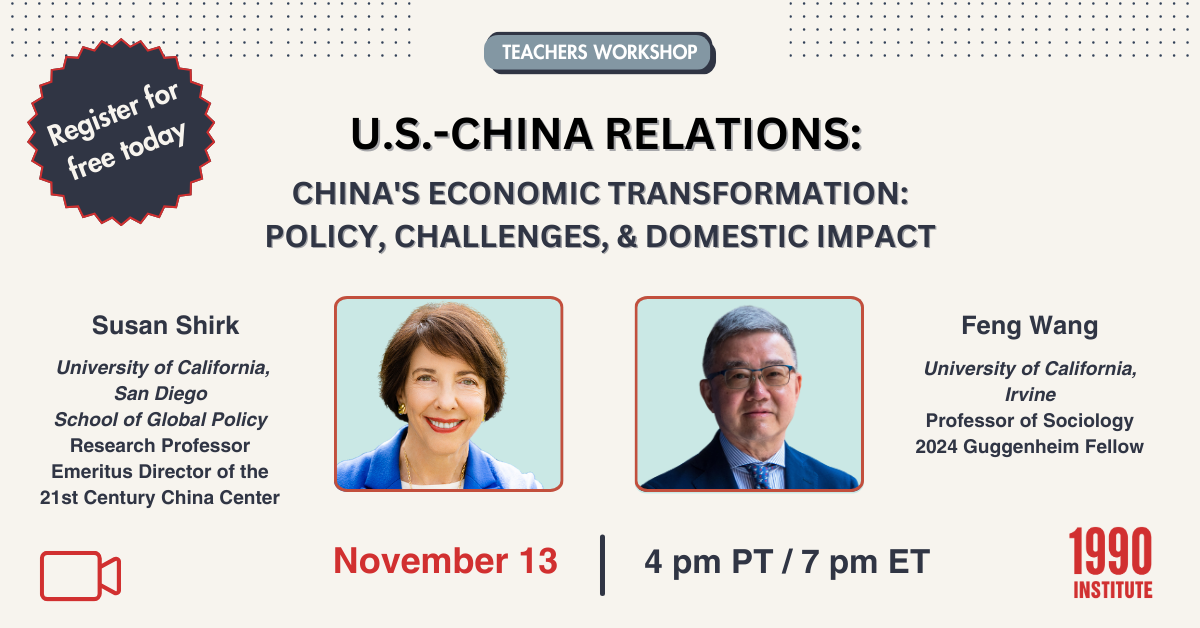| | | | Dear Friends, During this period of anticipation of the transition in our country’s leadership, we are sharing ways that we can all better understand China today. Please join us for our upcoming webinar on Wednesday, November 13, “China's Economic Transformation: Policy, Challenges, & Domestic Impact,” which will be the first workshop in a two-part series on China’s economy. Topics will include China's internal challenges and economic rise over the past 40 years. This will be followed by the second session in March 2025, focusing on the impact of China’s economic evolution on the United States and the global community. Free registration for next week’s session is available here. In addition, we would like to draw your attention to our New Asian American Voices initiative, which was conceived during the COVID-19 lockdown when news about anti-Asian hate abounded. We started this program on Instagram in 2021 to spotlight Asian American individuals and collectives and to celebrate their impact across all aspects of American life and counter the perpetual foreigner and model minority stereotypes of Asian Americans. We are offering an exciting expansion of this program that invites middle and high school students to participate and to see their work published on our social media accounts. Follow our program on Instagram. November is a time for gratitude. We would like to thank you, our individual supporters, who share our goal of educating the next generation with fact-based, engaging content that educators want and students need to be informed global citizens. In the spirit of Giving Tuesday, we are asking for any donations you can offer so we may continue our important work and provide free resources and carefully curated content that educators and the general public can use to better understand Asian American culture and history and the complexities of the evolving U.S.-China relationship. We are pleased to announce that the 1990 Institute can now accept donations via Zelle, which eliminates merchant fees charged by Paypal and credit card companies. Our Zelle handle is donation@1990institute.org. If you are able to make a charitable contribution of any amount, we would be very grateful to continue our work. Please scroll down to Spotlight for more news. Be sure to share our newsletters with your friends and family and encourage them to subscribe. Thank you! |
| |  |
|
| | | Have recent U.S.-China talks translated into action? By Denise Yiran Zheng
This year marks the 45th anniversary of the establishment of diplomatic relations between China and the U.S. thanks to bilateral efforts to advance U.S.-China relations. At the Asia-Pacific Economic Cooperation (APEC) summit in San Francisco In November 2023, President Joe Biden and Chinese President Xi Jinping indicated a mutual interest in stabilizing the currently turbulent U.S.-China relationship. Have these inclinations translated into actions? Let’s look at three key areas: military-to-military communication, counternarcotics efforts, and climate cooperation. Many eyes were on the resumption of U.S.-China military communications, which China severed in August 2022. In January 2024, the U.S.- People's Republic of China Defense Policy Coordination Talks, last held in September 2021, resumed to set the agenda for further military exchanges. U.S. defense officials emphasized the “importance of maintaining open lines of military-to-military communication in order to prevent competition from veering into conflict.” Then, U.S. National Security Advisor Jake Sullivan met with Xi Jinping in Beijing in August to further the implementation of commitments on military-to-military communications, counternarcotics, and AI safety and risk. Most recently in September, Admiral Sam Paparo, the head of the U.S. Indo-Pacific Command, had a video call with Wu Yanan, commander of China’s Southern Theater, in which Paparo urged the Chinese military to reconsider “its use of dangerous, coercive, and potentially escalatory tactics in the South China Sea and beyond.” The import of fentanyl into the U.S. is a major concern and the Biden-Harris administration has urged both China and Mexico to stem its flow. In January 2024, the U.S.-China counternarcotics commission held its inaugural meeting. China also agreed to cooperate on enforcing regulations regarding pill press exports, a crucial aspect of the illegal drug trade that facilitates the production of lethal OxyContin pills. This was an important step forward as prior to the 2023 APEC meeting, bilateral counternarcotics talks had been suspended by China for two years due to tensions over Taiwan and human rights issues. On the topic of climate, U.S. climate envoy John Podesta visited Beijing in September 2024 for the U.S.-China Working Group on Enhancing Climate Action in the 2020s and met with China's Special Envoy for Climate Change Liu Zhenmin and China’s foreign minister Wang Yi. The two groups reaffirmed their commitment to jointly host a Methane and Other Non-CO2 Greenhouse Gases Summit at the United Nation’s 29th annual climate conference, COP29, which will be held in Baku, Azerbaijan from November 11 to 22, 2024. Both countries are committed to halt and reverse forest loss by 2030 and promote global forest conservation. However, uncertainties around cooperation persist amid the U.S. presidential election, ongoing at the time of this writing, especially since former President Donald Trump ended climate dialogue with China in 2017 and withdrew the U.S. from the Paris Agreement. In contrast, Vice President Kamala Harris supported Biden's decision to rejoin the Paris Agreement in 2021. The new administration's approach to U.S.-China engagement will shape the next decade of international cooperation and global peace. As U.S. National Security Advisor Sullivan said this past summer, “We believe that competition with China does not have to lead to conflict or confrontation. The key is responsible management through diplomacy.” APEC 2024 will be held from November 10 to 16 in Lima, Peru. |
| |
|
| | Most Asian Americans and Pacific Islanders think legal immigration gives U.S. a major economic boost, AP-NORC poll finds | PBS News Asian American, Native Hawaiian and Pacific Islander adults are more likely than the overall U.S. population to view legal immigration as an asset to the country’s economy and workforce, according to a new poll. Groups slam Trump's comparison of Jan. 6 rioters to Japanese Americans incarcerated in WWII | NBC News Several Japanese American leaders condemned Trump’s comments, with the president and CEO of the Japanese American National Museum calling them an “egregiously inaccurate and flawed historical analogy.” Simu Liu criticizes Canadian boba tea company over concerns of cultural appropriation | NBC News On an episode of Canada’s "Dragons' Den," the actor criticized two business owners who claimed to have "transformed" boba tea. Liu took issue with the concept of “taking something that’s very distinctly Asian in its identity and, quote unquote, making it better.” For more on this topic, hear Margaret Yee, a speaker at our workshop on Asian American identity, discuss this exact issue. See the full workshop on YouTube and get our exclusive lesson plan, which has a section on using food to understand Asian American history and culture. China ends international adoption. Reactions range from shock to relief | NPR After three decades, China suddenly announced it was ending its international adoption program, sending shockwaves through the adoption community. China's youth unemployment rate falls after climbing for two straight months | CNBC The jobless rate for 16-to-24-year-olds in China, excluding students, fell a point in September, offering officials relief after youth unemployment hit fresh highs for two straight months. Breast cancer rises among Asian American and Pacific Islander women, and experts aren't sure why | CBS News This group once had relatively low rates of diagnosis which are rising, especially among young women. Experts suspect the answer is complex ranging from cultural to lifestyle shifts. California bans universities from admitting students based on ‘legacy’ | The Guardian The legislation, in effect from September 2025 and authored by California state assembly member Phil Ting, will block colleges from giving preference to pupils close to alumni and donors. Ting’s office called legacy admissions an “unfair practice [that] often results in a wealthier, less racially diverse student body.” Millions joined a livestream selling tickets to space on a Chinese rocket | CNN Two tickets for passage on what could be the first Chinese rocket ship to take tourists to space were sold, as the country’s commercial space firms aim to join a small but expanding global space tourism industry. As Shohei Ohtani takes center stage, remembering baseball at Manzanar prison camp | Los Angeles Times As millions cheered Shohei Ohtani’s debut in the World Series at Dodger Stadium, a couple of dozen ballplayers of Japanese descent gathered on a recently reconstructed diamond at Manzanar, 200 miles north, to commemorate a time when every single one of them would have been caged behind barbed wire. One’s got a big appetite, the other’s a bit of an introvert. China’s new panda diplomats touch down in DC | CNN Two giant pandas from China, Bao Li and Qing Bao, both 3 years old, have landed in Washington, marking the first time the U.S. capital has welcomed a new set of furry diplomats from Beijing in 24 years. |
| | | |
|
| | - REGISTER FOR OUR WORKSHOP ON CHINA’S ECONOMIC TRANSFORMATION ON NOVEMBER 13 – Key topics for “China's Economic Transformation: Policy, Challenges, & Domestic Impact” include China’s economic policy and growth, the role of the government, and the transformation within China over the past 40 years. Our workshops are open to everyone interested in the topics. Educators who participate will be equipped to help students understand these issues. Register for free and join us on November 13 at 4 pm PT / 7 pm ET. We are pleased to have two renowned experts in the area of U.S.-China relations as our speakers: Susan Shirk, a member of the 1990 Institute’s Advisory Council, a research professor, and the director emeritus of the 21st Century China Center at the School of Global Policy and Strategy at UC San Diego; and Feng Wang, a professor of sociology at UC Irvine and a 2024 Guggenheim Fellow.
- JOIN US FOR NEW ASIAN AMERICAN VOICES IN THE CLASSROOM – Our exciting expansion of our New Asian American Voices program complements Asian American and Pacific Islander (AAPI) and ethnic studies academic learning with real world skills. These skills include research, communications, creative development, media literacy, project management, and teamwork, which are skills defined in the Partnership for 21st Century Learning Frameworks as necessary for future success. Students have an opportunity to demonstrate their understanding of AAPI studies creatively in a manner of their choosing. Interested? Educators, parents, and students, please visit New Asian American Voices in the Classroom on our website to register and submit entries about trailblazing Asian American heroes.
- WATCH OUR STORYTELLING VIDEO COVERING 50 YEARS OF THE ECONOMIC RISE IN CHINA – Be sure to secure your spot for our November 13 webinar on the internal dynamics in China that led to immense changes. In the meantime, check out “The Rise of China as Seen Through Mrs. Wong’s Purse,” which tells the story of the life of “Mrs. Wong” over the past 50 years. The economic rise in China is illustrated by the tremendous changes in its citizens’ daily lives and by the contents of Mrs. Wong's purse. From the end of the Cultural Revolution to the opening of China to the lives of its people today, there have been enormous changes in virtually every aspect of life in China. Although Mrs. Wong is a fictitious character, her experience reflects that of many Chinese people living through five decades of policy and economic change.
|
| | Dim Sum - A Little Bit of Heart |
|  | |
|
|
|
| | | | 1990 Institute
P.O. Box 383 | San Francisco, California 94104
contact@1990institute.org www.1990institute.org Copyright 2024 The 1990 Institute. All rights reserved. |
| | | |
|
| |
|
|